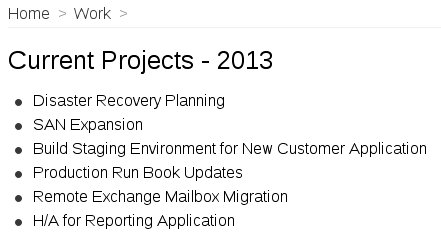Improve Your Job By Improving Your Relationship With Your Boss
Introduction
Most of us have jobs where we report to someone who has some type of authority over us in the workplace - “the boss”. The quality of your work life can vary greatly depending on the type of relationship you have with your boss.
If you have a respectful, supportive relationship, the work itself can be enjoyable. However, if your boss is someone who is very different from you or you can’t understand their motivations or reasoning, work can be unbearable.
At a basic level, your boss wants things to go smoothly. He doesn’t want any surprises and he doesn’t want his work (and therefor personal) life to get any more complicated or disrupted than it already is. There’s a good chance that you have a similar view.
By building a good relationship with your boss, you can help both of you meet that goal.
The Job
Take it upon yourself to have your boss’s success be one of your long-term goals. Being your boss’s ally is useful for him and he is likely to support you in turn. Keeping this in mind will help you understand the mindset that contributes to the rest of the things I cover here.
I once interviewed for a Network and Server Admin position at a company that was growing quickly. The environment was just barely under control. Several candidates had been interviewed already. After the technical interview was done, the boss asked me what I saw as being my responsibilities. I told him that one of my main jobs was to make his job easier. I got the job offer that afternoon.

Deal in Solutions, Not Problems
If the only time you go to your boss is because of problems, your boss will start to think “you = problem”. He’ll soon dread seeing you heading in his direction. Instead, when you go to your boss with problems (which you no doubt will have to do at times), bring several solutions to those problems with you. This will change your boss’s view of you from being a source of problems to a source of solutions.
Problem example:
“Boss, the flux capacitor failed. There’s no way to meet the deadline.”
Solution example:
“Boss the flux capacitor failed. I called around and found two companies that have them in stock. One is 10% more expensive, but they can get it to us overnight and we can be operational by noon. I can order it now if you approve.”
See the difference?
Compensate For Your Boss’s Weaknesses
Your boss, like most people, will have strengths in some areas and weaknesses in others. If one of your strengths match up with one of your boss’s weaknesses, there is opportunity to boost your value to him.
For example, if your boss dreads a particular meeting, volunteer to go in his place and fill him in on the important points afterward. Or, if your boss hates doing any kind of documentation, offer to write the first draft and then meet with him to put on the finishing touches.
Example:
My boss doesn’t like to write documentation. In his view, it’s a slow, tedious process with little reward. On the other hand, I like writing clear and concise documents. Over the course of a few weeks, I developed a document template and wrote over 30 policies and procedures. I sent them all to my boss, who reviewed them and made a few edits here and there. Those documents then became official policies within our company.

Toot Your Own Horn (If You Don’t, Who Will?)
Your boss is a busy person. It’s likely that he’s not fully aware of all the contributions you make to the success of his team. Make sure he knows!
It’s important to get the recognition you deserve, but it may be tricky to do that without appearing to be a braggart. One way to do this is to forward key emails to your boss with a note such as “FYI - I didn’t want to bother you at the time, but here’s the backstory in case the customer brings it up. Let me know if there was a better way to handle it.”
Remember, there’s a fine balance to this. Don’t overdo it. Provide the information without being boastful or denigrating others.
Take the Initiative - Seek Out Ways to Help
If you have downtime between assignments, look around to see how else you can help. Maybe a coworker could use some assistance. Maybe there is some research you could do to help further your (and your boss’s) goals. If you can’t find anything else, grab a broom and start improving your work area!
Don't be the person who needs constant management!
Be Enthusiastic
Enthusiasm is energizing. When you’re given a task to do, take it as a challenge to do it the best way you can. “Best” depends on the circumstances. It could mean the quickest, cheapest, most efficient, least disruptive, most accurate, longest lasting, safest, some combination of these things, or something else entirely. The point is to not take on the task like it’s drudgery.
Managers like enthusiastic employees. They're easier to manage and help bring a sense of teamwork to a group.
Have you had to work with a negative person?
Don’t Associate with Negative People
Just as enthusiasm is energizing, negativity is draining. No one likes to deal with people who never have anything good to say, and few people miss them when they leave.
Right or wrong, the people you associate with can affect the way people see you.
Take Satisfaction From Your Work
We all spend a lot of time at work - far too much time to be unhappy with what we’re doing. I’m not suggesting that you should expect joy and happiness all day every day (although it would be great if you do). But you can probably find certain things that are satisfying.
Example:
When I was a teenager, I worked for a catering company. We catered things like wedding receptions, award banquets, etc. The number of guests could be anywhere from 20 to 600. We would bring everything we needed to the event site with us, including all the food, plates, cups, saucers, glasses, serving dishes, tablecloths, utensils, and more. We sometimes even had to bring a portable stove with us!
We had to carry all of this from our truck to wherever we needed to set up. Often times, our access to the area was up several flights of fire escape. Outside. In the rain. It was a tremendous amount of work.
Things didn’t always go smoothly; sometimes we had to improvise to solve immediate problems very quickly. When the job was finished and we packed everything back up again, there was often a great sense of satisfaction. We did a huge amount of work and everything went perfectly (at least as far as the guests could tell). We weren’t saving the world, but what we did was important to someone and we did it well. It was satisfying.

Keep Track of Your Projects
Keep an active list of the tasks and projects you’re working on. This has two major benefits.
-
You can quickly and easily give your boss a status update. This shows that him that you’re on top of things.
- If your boss tries to add more work to your list, you can show him what you currently have going on and have him decide where the new work fits in as a priority. He may choose to add the new task to your list anyway, but at least you’ve provided him with the information he needs to make an informed decision.
Your list should be be written down and not just in your head. You could keep it on a whiteboard, a spreadsheet, or a project planning application. The on-line utilities Evernote and Workflowy are very useful for this.
Keep Track of Your Victories (And Losses)
During the year, keep notes about your assignments. Note the problems you encountered, the solutions you found to overcome them, and how the company benefited from your actions. At the same time, be honest about the things that did not go well and what you learned from them. The ability to adapt and overcome obstacles is a critical skill.
In both cases, this information can be useful for personal growth. It’s also useful when preparing for performance reviews or when making your case for a raise or increased responsibilities.

Is It “Brown-Nosing”?
If your only reason to follow some of the things I’ve talked about in this article is to ingratiate yourself with your boss, then maybe it is "brown-nosing" or "apple polishing".
However, if you do these things in an honest effort to improve your value to an organization and perhaps increase your job satisfaction and widen your opportunities, then I don’t think it is. I think it’s an honest, mature effort at self-improvement.
There's nothing wrong with that!
Your Responsibility
How much you benefit from your work life depends on your attitude and actions. Don’t expect anyone else to have as much of a vested interest in your success as you. It’s your responsibility!
Related Information
Steps To Take To Become A Good Employee
Being a good employee will help increase your value and opportunities within your company and help you survive tough economic times.








